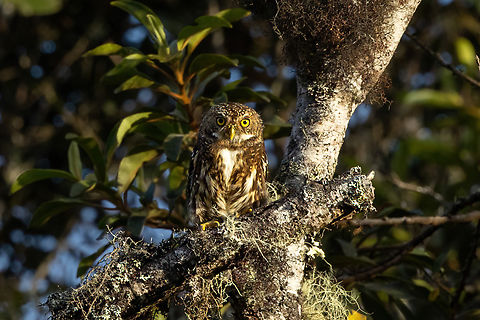
Appearance
The Yungas pygmy owl is about 16 cm long. Males weigh 55 to 58 g and females average 66.5 g . The species has three color morphs, a rarish gray one and common and widespread brown and rufous morphs. All have pale dots on the crown, back, and upper wings and pale bands on the tail. Their napes have "false eyes". Their undersides are pale with brownish streaks on the flanks and belly.Distribution
The Yungas pygmy owl is found on the east slope of the Andes of Peru south through Bolivia into northwestern Argentina. In elevation it usually ranges between 1,400 and 3,000 m but can be found as low as 900 m and in Bolivia as high as 3,900 m . It inhabits montane forest and cloudforest with heavy undergrowth and much moss and epiphytes, and also ''Podocarpus'' forest. It usually is found from the mid-levels of the forest into the canopy.Status
The IUCN has assessed the Yungas pygmy owl as being of Least Concern. Its population size has not been determined but is thought to have declined since the species was described. "Forest destruction and degradation [are] probably [the] main threat, although inaccessibility of parts of [its] range should afford some protection."Habitat
The Yungas pygmy owl is found on the east slope of the Andes of Peru south through Bolivia into northwestern Argentina. In elevation it usually ranges between 1,400 and 3,000 m but can be found as low as 900 m and in Bolivia as high as 3,900 m . It inhabits montane forest and cloudforest with heavy undergrowth and much moss and epiphytes, and also ''Podocarpus'' forest. It usually is found from the mid-levels of the forest into the canopy.Reproduction
Almost nothing is known about the Yungas pygmy owl's breeding phenology. It is thought to nest primarily in old woodpecker holes.Food
The Yungas pymy owl is primarily nocturnal and crepuscular, though it can be active in daylight. It forages mostly in the canopy and in dense foliage below it for insects and other arthropods, small birds, and possibly reptiles.References:
Some text fragments are auto parsed from Wikipedia.